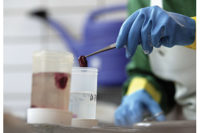 During a conversation with one of our suppliers of boneless beef last week I was asked whether we used “love” in any of our burgers. I said, “Love, what is love?” He went on to inform me that is how he referred to beef hearts.
During a conversation with one of our suppliers of boneless beef last week I was asked whether we used “love” in any of our burgers. I said, “Love, what is love?” He went on to inform me that is how he referred to beef hearts.
I asked why speak in code; why not just ask if I used hearts in my burger? He responded that in some cases customers do not want him to refer to them by name because of the negative perception customers may have if they knew they used hearts in their burgers.
He continued, “I suppose given your response that you do use hearts your burgers”.
I answered that in fact we did not use hearts or head and cheek meat in our burgers, yet not for fear of the possible negative perception by the public — in fact we believe beef hearts are a good lean source of protein. The reason we do not use hearts in any of our burgers is for food safety reasons.
As most know we as an industry have made big strides and advances in the reduction of E. coli O157:H7 through multiple hurdle interventions employed to the surface of the carcass. The question has been: Given the biological hazard of E. coli O157:H7 in slaughter, is there a process step we can put in place to reduce or eliminate the hazard? Yes -- hot water/ steam pasteurization and antimicrobial sprays. Hot water and steam by far are the most effective next to prevention. (Prevention: that’s for another day).
Proven through science, these interventions have been successful in reducing pathogenic bacteria in beef and hence have made our burgers safer.
However most do not know that these hot water and steam interventions are only employed to the carcass ... making only those products derived from the carcass and destined for grinding safer. Other inputs like hearts and cheeks do not go through these carefully monitored interventions. Hearts and cheeks follow a far different path.
During harvesting hearts fall onto the gut table, and prior to any antimicrobial spray are incised by government inspectors, which increases the surface of the heart and potentially trans locates dangerous bacteria from the surface of the heart to the center.
It is for these reasons, combined with our own in-house test results on hearts that have led us to the conclusion that hearts have been the input responsible for the most recent burger recalls in Canada.
Given the old adage “You cannot not know what you already know” it’s not enough for us to stop at just removing these riskier inputs from our burgers. We are also advocating governments and industry disallow hearts and cheeks from being allowed in ground products, period, while working with industry, the CFIA and food scientists to develop heat pasteurization interventions that can be successfully deployed on these inputs.
Who would have thought that a world without love could be a much safer place?




Report Abusive Comment